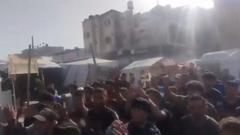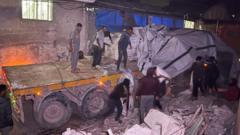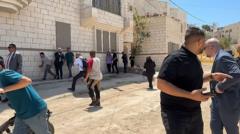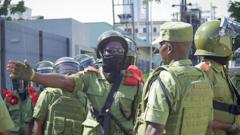Demonstrations in Khan Younis highlight growing opposition to Hamas leadership as residents face dire conditions due to war and displacement.**
Third Day of Anti-Hamas Protests Erupts in Southern Gaza**

Third Day of Anti-Hamas Protests Erupts in Southern Gaza**
Renewed protests against Hamas reflect public discontent amid ongoing conflict.**
In a significant show of dissent, hundreds of Palestinians have joined protests against Hamas in southern Gaza, marking the third consecutive day of demonstrations. The protests, concentrated in Khan Younis, have seen participants chanting slogans demanding the removal of Hamas, including "Out! Out! Out! All of Hamas, out!" Videos circulated on social media capturing the growing unrest, which is particularly notable given the risks associated with speaking out against the militant group.
The protests reportedly began on Monday, initiated by young activists who were motivated by a recent interview with Hamas leader Sami Abu Zuhri, where he referred to the conflict with Israel as "eternal." Palestinian anger was fueled by his insistence that Hamas would continue to sacrifice lives for the cause. Frustration has escalated amidst daily Israeli airstrikes in Khan Younis and a recent large-scale evacuation order impacting eastern residents.
Demonstrators expressed their grievances, with some accusing Hamas of commodifying their suffering. One protestor, who spoke under the pseudonym Alaa, articulated the desperation facing residents, who are grappling with displacement and food scarcity. Alaa emphasized that the Palestinian resistance spirit existed independently of Hamas, indicating that even if the group were ousted, resistance would endure.
Activists have noted a recent surge in anti-Hamas sentiment across Gaza, particularly in regions where military and civilian pressures compound hardships. In January, a young participant was killed after serious retaliation from militants, underlining the potential peril for those publicly opposing Hamas. Despite these risks, the rising tide of public dissent appears fueled by a combination of dire humanitarian conditions and exasperation with Hamas's governance.
Moumen al-Natour, a lawyer and anti-Hamas movement co-founder, pointed out that the displacement and overall toll of war have prompted a collective frustration against Hamas's refusal to disarm and negotiate. The United Nations reported on May 15 that over 57,000 individuals had been forcibly displaced due to conflict, which aligns with the broader narrative of suffering across Gaza, where over 53,000 fatalities have been recorded since the outbreak of major hostilities in October 2023.
Given the ongoing conflict ignited by Hamas’s surprise assault on Israel, which left approximately 1,200 dead, the protests reflect a pivotal moment in Gaza's sociopolitical landscape, as the populace increasingly demands accountability and change in leadership amid widespread upheaval.
The protests reportedly began on Monday, initiated by young activists who were motivated by a recent interview with Hamas leader Sami Abu Zuhri, where he referred to the conflict with Israel as "eternal." Palestinian anger was fueled by his insistence that Hamas would continue to sacrifice lives for the cause. Frustration has escalated amidst daily Israeli airstrikes in Khan Younis and a recent large-scale evacuation order impacting eastern residents.
Demonstrators expressed their grievances, with some accusing Hamas of commodifying their suffering. One protestor, who spoke under the pseudonym Alaa, articulated the desperation facing residents, who are grappling with displacement and food scarcity. Alaa emphasized that the Palestinian resistance spirit existed independently of Hamas, indicating that even if the group were ousted, resistance would endure.
Activists have noted a recent surge in anti-Hamas sentiment across Gaza, particularly in regions where military and civilian pressures compound hardships. In January, a young participant was killed after serious retaliation from militants, underlining the potential peril for those publicly opposing Hamas. Despite these risks, the rising tide of public dissent appears fueled by a combination of dire humanitarian conditions and exasperation with Hamas's governance.
Moumen al-Natour, a lawyer and anti-Hamas movement co-founder, pointed out that the displacement and overall toll of war have prompted a collective frustration against Hamas's refusal to disarm and negotiate. The United Nations reported on May 15 that over 57,000 individuals had been forcibly displaced due to conflict, which aligns with the broader narrative of suffering across Gaza, where over 53,000 fatalities have been recorded since the outbreak of major hostilities in October 2023.
Given the ongoing conflict ignited by Hamas’s surprise assault on Israel, which left approximately 1,200 dead, the protests reflect a pivotal moment in Gaza's sociopolitical landscape, as the populace increasingly demands accountability and change in leadership amid widespread upheaval.



















